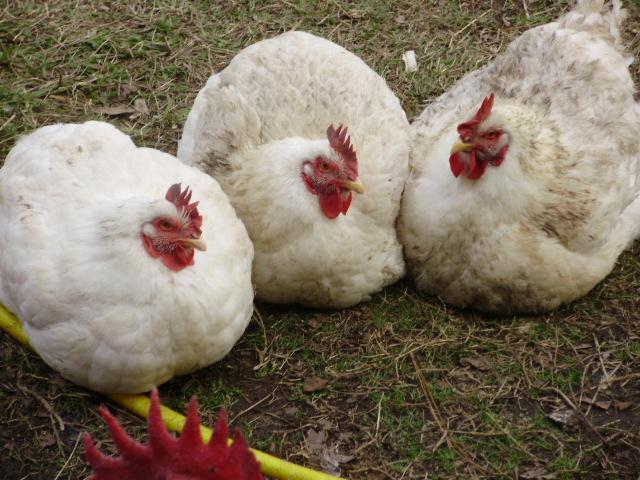At the beginning of July our first ever broody hen started hatching her eggs. Well I should say egg because that is all that hatched out of five. How's that for a natural hatching percentage?  ) Anywho I felt bad for the lonely little roo and I went to the feed store to buy him a buddy. I was in luck because they had just one lonely two day old hanging around. I snapped him (also a roo) up and headed home without even bothering to ask what kind of chicken I had just purchased. Mama was more than happy to mother another chickee and off they went. Well it's become quite apparent that the purchased roo is a Cornish X and we've all become so attatched. He has personality! He rides around on our shoulders and comes running up to us whenever we're in the backyard. I'm so disheartened that he has a shortened life span riddled with very possible health issues. He forages just like his adopted mother taught him and he has no problem keeping up with his adopted sibling or flockmates.
) Anywho I felt bad for the lonely little roo and I went to the feed store to buy him a buddy. I was in luck because they had just one lonely two day old hanging around. I snapped him (also a roo) up and headed home without even bothering to ask what kind of chicken I had just purchased. Mama was more than happy to mother another chickee and off they went. Well it's become quite apparent that the purchased roo is a Cornish X and we've all become so attatched. He has personality! He rides around on our shoulders and comes running up to us whenever we're in the backyard. I'm so disheartened that he has a shortened life span riddled with very possible health issues. He forages just like his adopted mother taught him and he has no problem keeping up with his adopted sibling or flockmates.
So down to the actual inquiries:
How old can cornish x get?
Is it a good idea to let them get older or should they be processed?
Is is worth it to let them breed?
Are they even interested in breeding?
Thanks for your time!
 ) Anywho I felt bad for the lonely little roo and I went to the feed store to buy him a buddy. I was in luck because they had just one lonely two day old hanging around. I snapped him (also a roo) up and headed home without even bothering to ask what kind of chicken I had just purchased. Mama was more than happy to mother another chickee and off they went. Well it's become quite apparent that the purchased roo is a Cornish X and we've all become so attatched. He has personality! He rides around on our shoulders and comes running up to us whenever we're in the backyard. I'm so disheartened that he has a shortened life span riddled with very possible health issues. He forages just like his adopted mother taught him and he has no problem keeping up with his adopted sibling or flockmates.
) Anywho I felt bad for the lonely little roo and I went to the feed store to buy him a buddy. I was in luck because they had just one lonely two day old hanging around. I snapped him (also a roo) up and headed home without even bothering to ask what kind of chicken I had just purchased. Mama was more than happy to mother another chickee and off they went. Well it's become quite apparent that the purchased roo is a Cornish X and we've all become so attatched. He has personality! He rides around on our shoulders and comes running up to us whenever we're in the backyard. I'm so disheartened that he has a shortened life span riddled with very possible health issues. He forages just like his adopted mother taught him and he has no problem keeping up with his adopted sibling or flockmates.So down to the actual inquiries:
How old can cornish x get?
Is it a good idea to let them get older or should they be processed?
Is is worth it to let them breed?
Are they even interested in breeding?
Thanks for your time!
Last edited:








